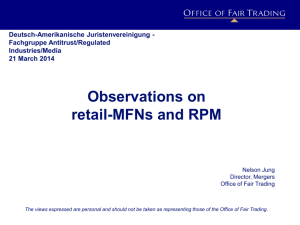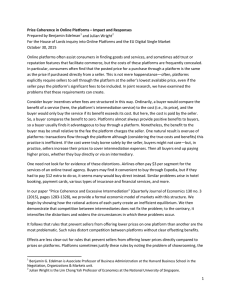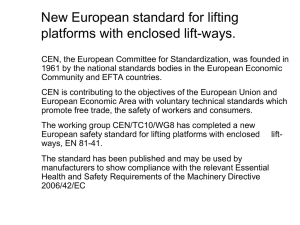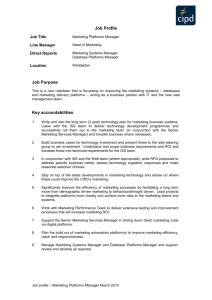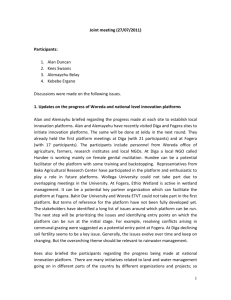Across-Platform Parity Agreements
advertisement
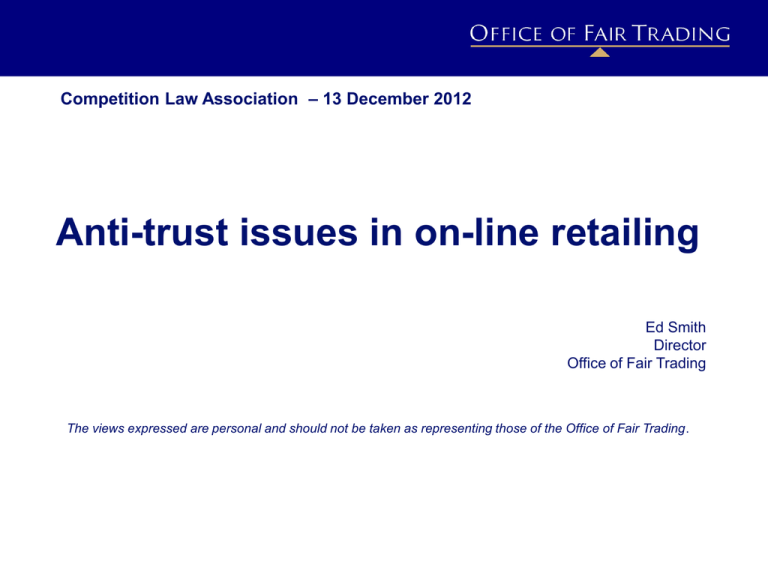
IMPACT h o rLaw i z ESTIMATION oAssociation n s c a n nPROJECT i –n 13 g December 2012 Competition Anti-trust issues in on-line retailing Ed Smith Director Office of Fair Trading The views expressed are personal and should not be taken as representing those of the Office of Fair Trading. Anti-trust issues in online retailing Anti-trust issues in online retailing similar to traditional issues….. - Non – price vertical issues - Selective Distribution Vertical pricing issues – RPM/MFN/Price parities Others - Information exchange, data, abuse of dominance ……but online environment brings certain issues into greater focus: - Pricing transparency, lower search costs Monitoring of prices Agency Service levels - free rider Consumer Data Price discrimination LEAR: Across-Platform Parity Agreements ● Requires the seller to sell a good or service on a platform at a price that is not higher than the price the seller charges on other platforms Seller Parties to the PRA Platform 2 Platform 1 p1D ≤ p2D p2D Buyer Effects of Across-Platforms Parity Agreements ● Potential effects of Across-Platforms Parity Agreements - Price of goods or services on platform is defined in relation to the price charged on other, competing platforms Platforms serving as intermediaries, prevalent in the online world ● Theories of harm - - May foreclose effective entry of other platforms – sellers are prevented from charging lower prices on a new platform that would be prepared to charge the seller a lower transaction fee; reduces ability of new platforms to attract buyers and sellers; entry may be prevented if new entrant is more efficient than incumbent(s) May soften competition between platforms, thereby increasing the fees paid by the sellers and, as a consequence, the prices charged to customers - customers buying from the platform with the lower transaction fee to some extent subsidise customers buying from the platform with higher transaction fees, which lowers the incentive of platforms to reduce transaction fees May facilitate collusion between platforms – if platforms set collusive fees to sellers, the advantage of deviating by reducing the sellers’ fee is strongly diminshed as the fee reduction will be passed on also to customers using other platforms; also improves monitoring ability May facilitate collusion between sellers– limit the ability of sellers to price-discriminate across platforms and thus may facilitate collusion insofar as they improve the sellers’ ability to monitor each other’s pricing and reduce the cost of enforcing a horizontal agreement ● Potential efficiencies - May serve to protect a platform’s investments (When) do MFNs result in RPM? ‘MFNRPM’? ‘supplier’ MFN RPM ‘buyer’ 2010 Vertical Guidelines and agency ● Guidelines clear that it is possible to fall within the scope of Article 101(1) irrespective of whether the agent/intermediary selling goods or services on behalf of another undertaking takes title (and ‘re-sells’) ● In the case of agency agreements, the principal normally establishes the sale price, as the agent does not become the owner of the goods. However, where such an agreement cannot be qualified as an agency agreement for the purposes of applying Article 101(1) an obligation preventing or restricting the agent from sharing his commission, fixed or variable, with the customer would be a hardcore restriction under Article 4(a) of the Block Exemption Regulation. In order to avoid including this hardcore restriction in the agreement, the agent should thus be left free to lower the effective price paid by the customer without reducing the income for the principal. (paragraph 49 of the Vertical Guidelines, emphasis added) Retail-MFNs and genuine agency ● Concept of ‘single economic unit’ whereby agent is comparable to ‘commercial employee’ ● A range of factors to assess ‘genuine agency’ - Is the commercial and/or financial risk borne by the agent in relation to the supply of the relevant goods or services ‘material’ or ‘non-negligible’? • • • - Does the agent have influence over the principal’s commercial strategy? • - Contract-specific risks, Market-specific investment risks ‘Other activities within the same product market’ If the principal is to take the risks, it therefore is in a position to determine commercial strategy Assessment of other factors illustrating (lack of) unity of conduct between principal and agent E-books ● EU E-books Article 27(4) Communication ‘For a period of two years, the Four Publishers will not restrict, limit or impede ebook retailers' ability to set, alter or reduce retail prices for e-books and/or to offer discounts or promotions. However, as regards agency agreements, the aggregate value of the price discounts or promotions offered by any retailer should not exceed the aggregate amount equal to the total commissions the publisher pays to that retailer over a 12-month period in connection with the sale of its e-books to consumers. Moreover, for a period of five years: (i) the Four Publishers will not enter into any agreement relating to the sale of e-books within the EEA that contains a price MFN clause as defined in the Four Publishers' commitments; and (ii) Apple will not enter into any agreement relating to the sale of e-books in the EEA that contains a retail price MFN clause as defined in Apple's commitments.’ (emphasis added)
